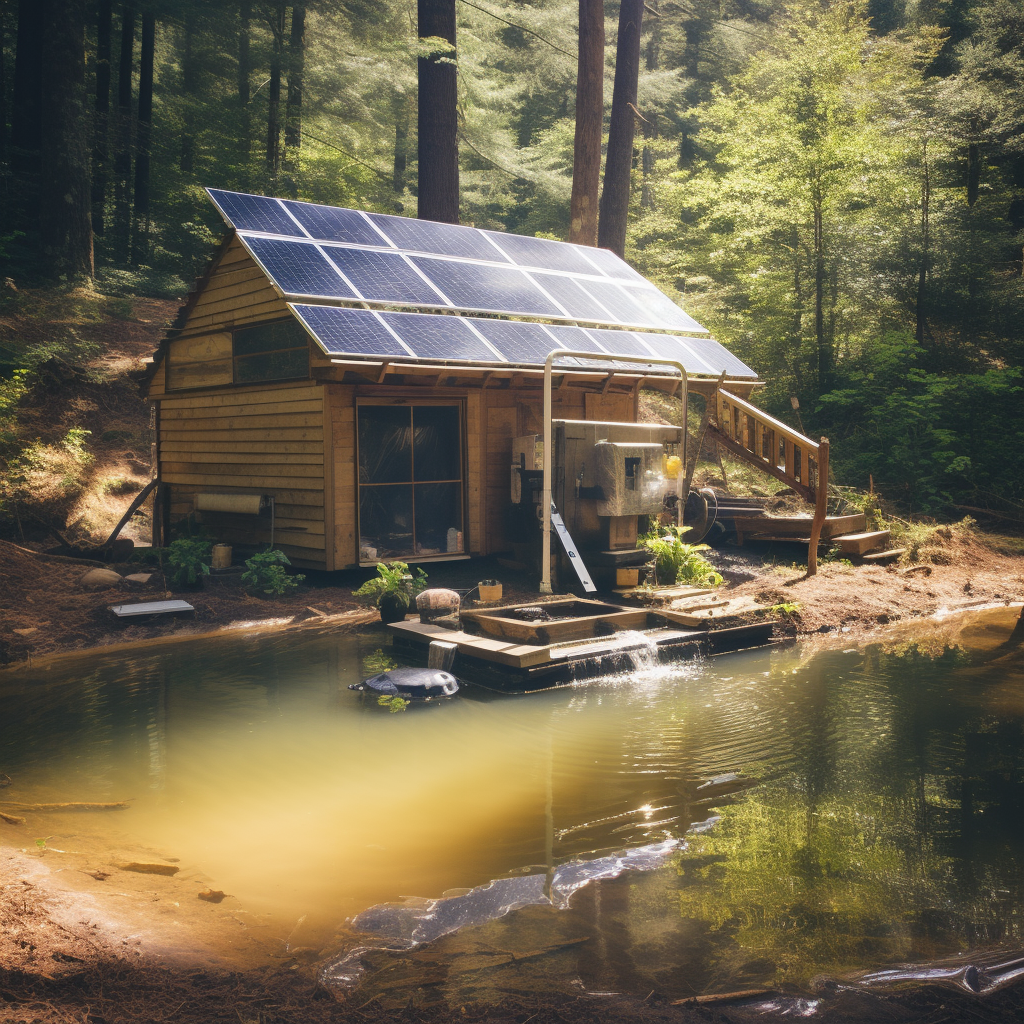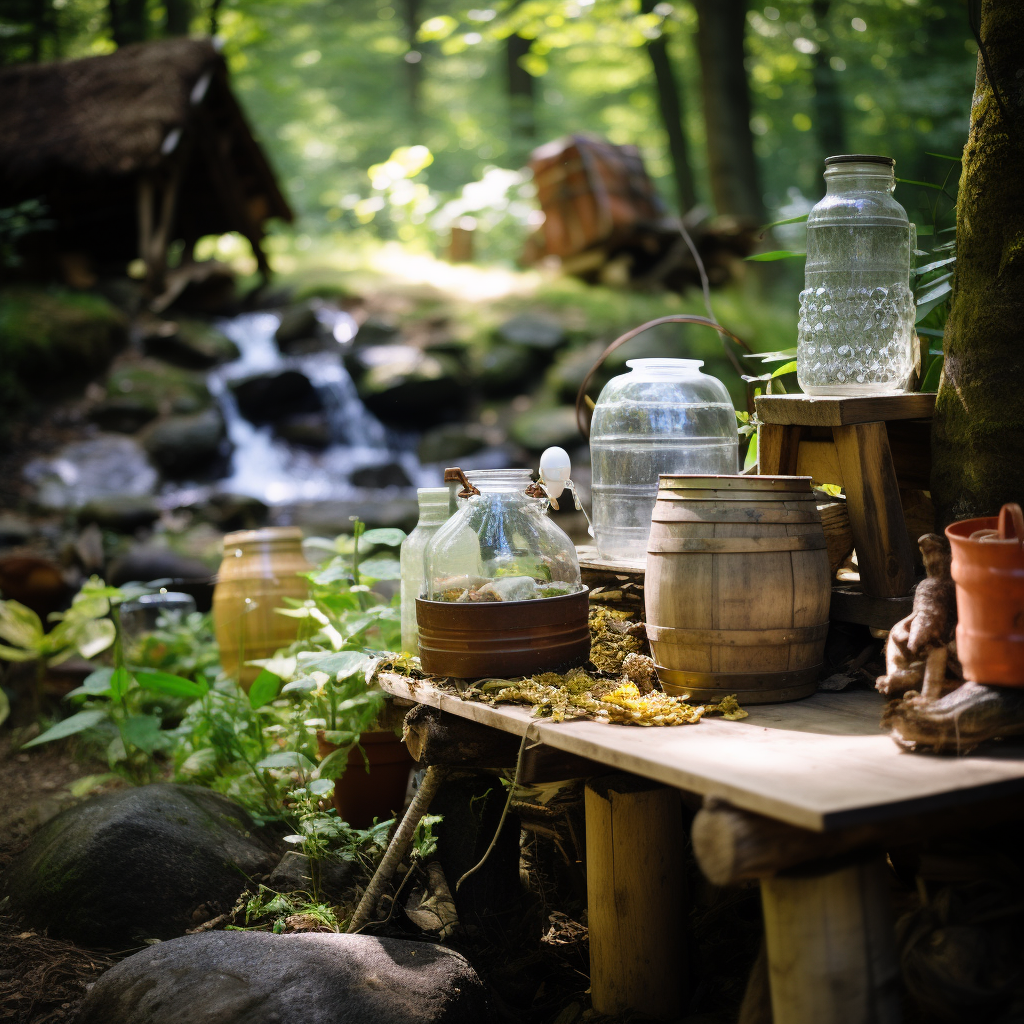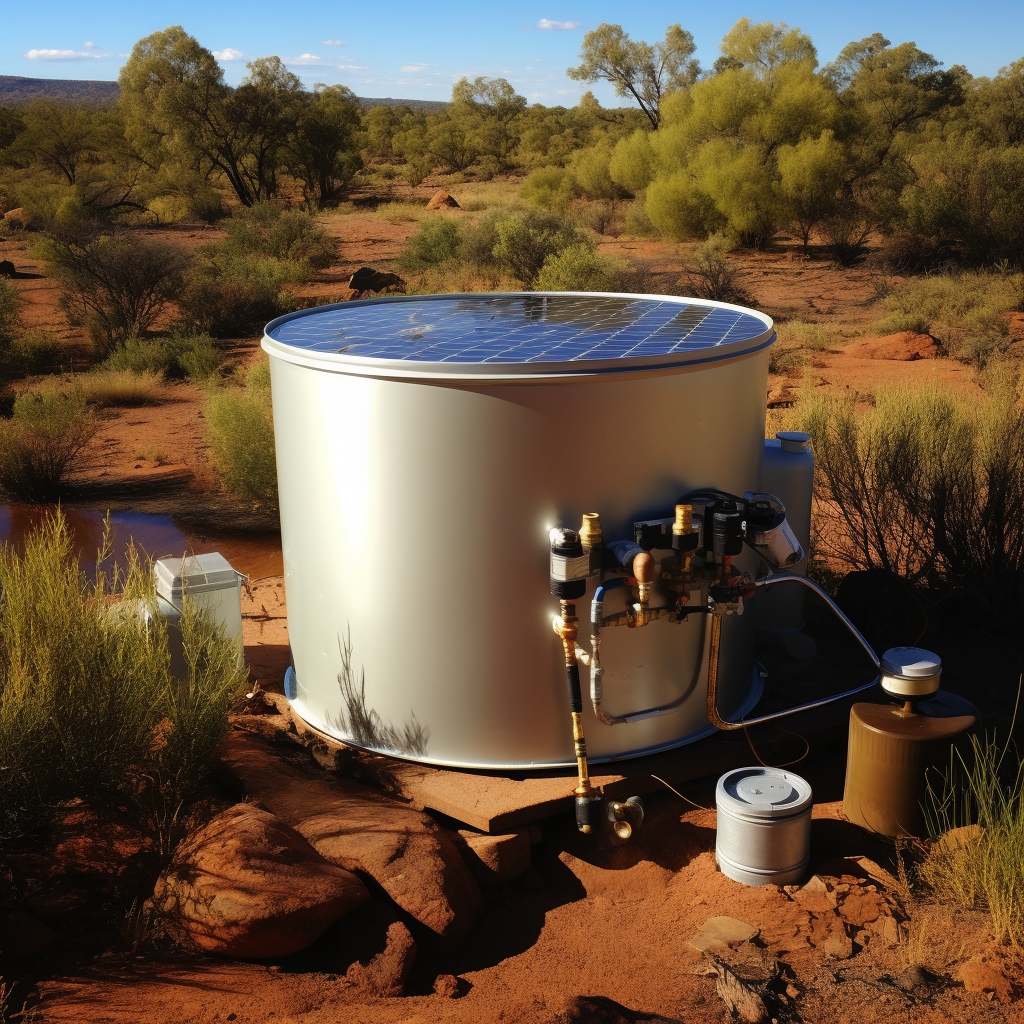So, you’ve decided to embrace the off-grid lifestyle and live completely self-sufficiently. That’s amazing! But have you ever wondered How to Make Your Own Fresh Water Living Off Grid without relying on the traditional water sources? Well, in this article, we’ll explore the ins and outs of making your own fresh water while living off the grid. Trust me, it’s easier than you might think!
When living off the grid, you won’t have access to the usual water supply systems, such as municipal water or a well. However, there are several alternative methods to obtain fresh water right on your own property. One popular option is rainwater harvesting. By collecting rainwater from your rooftops and storing it in tanks, you can have a consistent supply of fresh water. We’ll discuss the best practices for rainwater collection and storage to ensure the water is safe for consumption.
Another way to make your own fresh water off-grid is through the process of filtering and purifying water from a natural source, such as a stream or lake. This can be done using various filtration methods, such as ceramic filters or activated carbon filters. We’ll delve into the different types of filters available and guide you through the steps of setting up an efficient water purification system.
Lastly, we’ll touch upon the importance of water conservation when living off the grid. By implementing simple strategies like installing low-flow fixtures and practicing water-saving habits, you can minimize water wastage and make the most of your limited water resources. We’ll provide you with practical tips on how to conserve water without compromising your daily needs.
In conclusion, making your own fresh water while living off the grid is not only possible but also crucial for a sustainable and independent lifestyle. In this article, we’ll delve into the various methods of obtaining fresh water off-grid, including rainwater harvesting and water filtration. So, if you’re ready to learn more about these fascinating techniques, keep reading! You’ll soon have all the knowledge you need to make your off-grid water system a success.
Living off the grid is a lifestyle choice that has gained popularity in recent years. By relying on sustainable and self-sufficient methods, off-grid living allows individuals to disconnect from traditional utilities and become more in tune with nature. One of the most essential requirements for survival in any off-grid setting is access to fresh water. In this article, we will explore the benefits and challenges of living off the grid, as well as various methods of obtaining, purifying, storing, and conserving water. By the end, you will have a good understanding of how to make your own fresh water living off the grid.
The benefits of living off the grid
Living off grid offers numerous benefits. Firstly, it provides a sense of self-sufficiency and independence. By relying on your own resources, you are no longer tied to external providers and their potential disruptions. Additionally, living off the grid can reduce your carbon footprint and help you become more environmentally conscious. You have the opportunity to utilize renewable energy sources, conserve water, and minimize waste. Furthermore, off-grid living can promote a simpler and more peaceful lifestyle, free from the distractions and stresses of modern society.
Challenges of living off the grid
While there are many advantages to living off the grid, there are also challenges that need to be addressed. One of the biggest challenges is access to basic amenities, such as fresh water. Off-grid living often means being far away from public water supplies, requiring individuals to find alternative water sources and implement sustainable water systems. Additionally, off-grid living may involve a higher initial investment for setting up self-sufficient infrastructure, such as water collection systems and filtration systems. It is crucial to be prepared for the potential difficulties that may arise when living off the grid.

Finding a suitable location for off-grid living
Before delving into water systems, it is essential to find a suitable location for off-grid living. Factors to consider include the availability of water sources, climate conditions, proximity to amenities, and legal considerations. It is important to consult local regulations and obtain any required permits before establishing an off-grid dwelling. Additionally, take into account the availability of natural resources, such as rainfall and access to groundwater. A thorough assessment of the chosen location will ensure successful off-grid living.
Importance of fresh water
Fresh water is essential for survival and maintaining good health. It is crucial to have a sufficient and clean water supply when living off the grid. Without access to public utilities, individuals must take responsibility for obtaining their own fresh water. Water is needed for drinking, cooking, cleaning, and sanitation purposes. It is important to be aware of the significance of fresh water and the potential consequences of not having a secure water source.
Water sources for off-grid living
In off-grid living, there are several sources of water that can be utilized. These include rainwater, groundwater from wells, surface water from rivers or lakes, and natural springs. Each water source has its own benefits and considerations. Understanding the different options will help you make an informed decision based on your location and water needs. It is also important to be conscious of water rights and regulations in your area when accessing these water sources.
Methods of obtaining fresh water
When living off the grid, there are various methods to obtain fresh water. These methods involve collecting and storing water from rain, wells, surface water, or natural springs. Let’s explore some of these methods in more detail.
Rainwater harvesting
Rainwater harvesting is a popular and effective method of collecting water. By installing rainwater collection systems, you can capture and store rainwater for later use. This can be done through the use of gutters, downspouts, and storage tanks. Rainwater harvesting systems can be as simple or complex as desired, depending on the needs and resources available.
Setting up a well system
Another reliable method of obtaining fresh water is by setting up a well system. This involves drilling a well into the ground to access groundwater. It is important to consult local regulations and hire professionals to ensure the well is properly constructed and maintained. Well water can be a sustainable and dependable source of fresh water, especially in areas with high water tables.
Collecting and treating surface water
Surface water, such as from rivers or lakes, can also be utilized for off-grid living. However, it is essential to treat and filter the water before consumption. Water filtration methods, such as using portable water filters or ultraviolet light, can help eliminate harmful bacteria and pathogens. It is important to regularly test the water quality to ensure its safety.
Utilizing natural springs
If you are fortunate enough to have access to natural springs, they can be an excellent source of fresh water. Natural springs typically provide clean and uncontaminated water. However, it is still recommended to have the water tested periodically to ensure its quality.
Building a water collection system
Once you have determined the water source that works best for your off-grid living situation, it is important to build a water collection system that suits your needs. Here are some considerations and tips for building an effective water collection system.
Choosing the right water collection system for your needs
The type of water collection system you choose will depend on various factors, such as available space, budget, and expected water demand. Consider whether you want an above-ground or underground storage tank, the capacity of the tank, and the materials used for construction. It is also important to align your water collection system with your overall off-grid living setup to ensure seamless integration.
Installation and maintenance tips
Proper installation and regular maintenance are essential for the longevity and efficiency of your water collection system. Ensure the system is correctly installed by following manufacturer instructions or consulting professionals. Regularly check for leaks, clean debris from gutters and downspouts, and inspect the overall condition of the system. Maintaining your water collection system will help ensure a continuous supply of fresh water.
Ensuring water quality and safety
It is crucial to prioritize water quality and safety when living off the grid. Regularly test the water collected to ensure its purity and potability. Monitor the condition of the storage tanks and filtration systems, and replace any damaged or expired components as needed. By being diligent with water quality checks and maintenance, you can enjoy a safe and reliable water supply.

Purifying and filtering water
Even with proper water collection systems in place, it is still important to purify and filter the water before using it for drinking or cooking. This is especially true for surface water sources that may contain contaminants. There are various methods of purifying water, such as boiling, chemical disinfection, and using ultraviolet light. Each method has its own advantages and considerations, so it is important to choose the one that best fits your needs.
The importance of water filtration
Water filtration is a crucial step in ensuring the safety and quality of off-grid water. Filtration systems, such as activated carbon filters and ceramic filters, can effectively remove impurities, sediment, and bacteria from the water. It is important to choose a filtration system that suits your water source and desired water quality. Regularly clean and maintain the filtration system to maximize its efficiency and lifespan.
Choosing the right filtration system
Selecting the right filtration system depends on various factors, including the water source, desired water quality, and budget. Consider the filtration system’s flow rate, micron size, and maintenance requirements. It is also important to choose a system that is certified by reputable organizations, ensuring its effectiveness in removing contaminants. Research different filtration options and consult professionals if needed to find the best system for your off-grid water needs.
Storing and preserving water
In off-grid living, it is crucial to have proper water storage to ensure a continuous water supply. While some water collection systems may have built-in storage tanks, additional storage options can provide extra security. Here are some considerations and tips for storing and preserving water.
Water storage options
Water storage options include above-ground or underground storage tanks, rain barrels, and cisterns. Consider the size and material of the storage containers to ensure durability and longevity. It is also important to protect the storage containers from direct sunlight and from freezing temperatures, as extreme conditions can affect the quality of stored water.
Tips for proper water storage
To maintain the quality of stored water, it is important to follow certain guidelines. Firstly, keep the storage containers clean by regularly rinsing and sanitizing them. Secondly, label the containers with the date of storage to ensure proper rotation and usage. Additionally, store water away from sources of contamination, such as chemicals or cleaning agents. Lastly, periodically test the stored water for quality and safety.
Long-term water preservation techniques
In certain situations, such as during emergencies or extended periods of drought, it may be necessary to implement long-term water preservation techniques. These techniques include using water treatment chemicals like chlorine or iodine, or storing water in advanced storage systems like underground tanks. It is crucial to research and implement the appropriate preservation techniques to ensure a safe and sustainable water supply.
Managing water usage
Conserving water is vital when living off the grid, as it ensures the longevity of available resources. Here are some tips for conserving water in daily activities and implementing smart water management strategies.
Conserving water in daily activities
Simple practices, such as turning off faucets when not in use, taking shorter showers, and fixing leaks promptly, can significantly reduce water wastage. Conserving water in daily activities requires mindfulness and awareness of water consumption habits. Encourage family members or housemates to adopt water-saving practices and educate them about the importance of water conservation.
Smart water management strategies
Implementing smart water management strategies can help optimize water usage in off-grid living. Consider installing water-efficient appliances and fixtures, such as low-flow toilets and showerheads. Use water-saving techniques in gardening, such as mulching and drip irrigation. Collect and reuse graywater for non-potable purposes, such as watering plants or flushing toilets. By incorporating these strategies, you can effectively manage and conserve your off-grid water supply.
Emergency water sources
Preparing for water emergencies is essential when living off the grid. While you may have reliable water systems in place, unforeseen circumstances may arise. Here are some alternative emergency water sources to consider.
Preparing for water emergencies
In case of emergency situations that disrupt your regular water supply, it is important to have a contingency plan. This plan should include identifying alternative water sources, storing extra water supplies for emergencies, and having the necessary equipment for water treatment and filtration. It is also important to educate yourself and your household members on emergency water procedures to ensure everyone’s safety.
Alternative emergency water sources
In emergency situations, alternative water sources may include nearby rivers or lakes, community water sources, or even neighboring off-grid properties. It is crucial to assess the suitability and safety of these alternative sources and take appropriate measures to treat and filter the water before use. Additionally, consider having emergency water storage containers readily available for immediate use during crises.

Testing and monitoring water quality
Regularly testing and monitoring the quality of your off-grid water is crucial for ensuring its safety and potability. Here are some considerations and tips for testing and maintaining water quality.
Regular testing for water quality
Periodic testing for water quality is important to identify any potential contaminants and ensure the safety of your water supply. This includes testing for bacteria, viruses, minerals, and other impurities. Various water testing kits and services are available, allowing you to conduct tests yourself or send samples to a certified laboratory for analysis. Regular testing will provide peace of mind and help you address any water quality issues promptly.
Signs of water contamination
It is important to be aware of the signs of water contamination in off-grid living. These signs can include changes in color, odor, or taste of the water. Additionally, individuals may experience gastrointestinal issues or other health problems after consuming contaminated water. If any changes or symptoms arise, it is essential to stop using the water immediately and have it tested for potential contamination.
How to maintain clean and safe water
Maintaining clean and safe water involves implementing proper water management practices. Regularly clean and disinfect water storage containers, filters, and other equipment. Inspect and maintain your water collection and filtration systems to ensure their efficiency. Keep track of maintenance schedules and replace components as needed. By being proactive in maintaining clean and safe water, you can prevent potential waterborne diseases and health risks.
Conclusion
Living off the grid and making your own fresh water may seem intimidating at first, but with the right knowledge and preparations, it can be a rewarding and sustainable lifestyle choice. By understanding the benefits and challenges of off-grid living, as well as various methods of obtaining, purifying, storing, and conserving water, you can achieve self-sufficiency and enjoy a continuous supply of fresh water. Remember the key takeaways from this article: prioritize water quality and safety, implement smart water management strategies, and regularly test and monitor your water supply. With these practices in place, you can successfully make your own fresh water living off the grid and enjoy the benefits of a sustainable and independent lifestyle.




